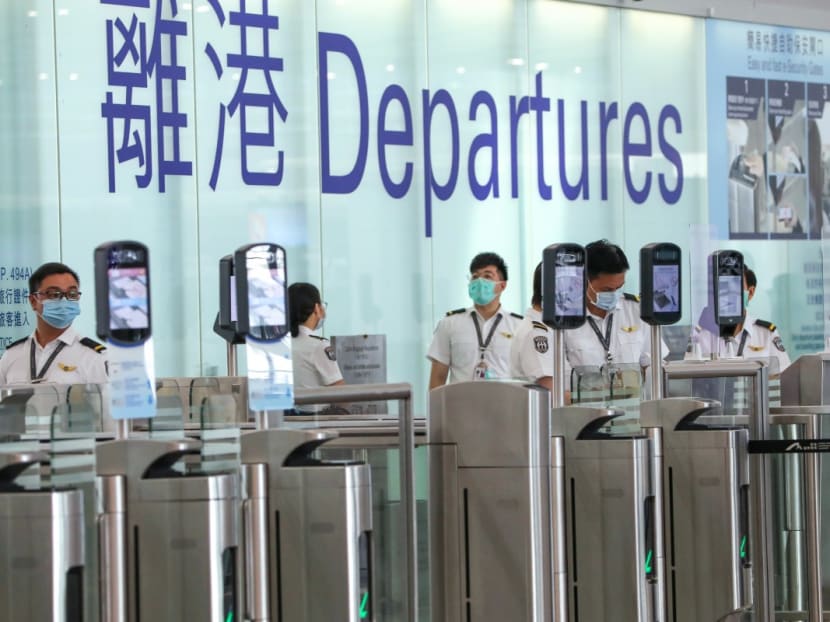Covid-19: Governments urged to move fast on travel bubbles in Asia-Pacific
HONG KONG — All talk and very little action are dashing hopes of travel bubbles that can allow a controlled flow of people between places, experts have said amid lockdowns and closed borders over the coronavirus pandemic.

Security staff guard an empty departure gate at Hong Kong International Airport amid the coronavirus pandemic.
HONG KONG — All talk and very little action are dashing hopes of travel bubbles that can allow a controlled flow of people between places, experts have said amid lockdowns and closed borders over the coronavirus pandemic.
"People are talking a lot about travel bubbles, but I only see one in existence: in the European Union, which has removed all cross-border travel restrictions," said Mr Subhas Menon, director general of the Association of Asia-Pacific Airlines (AAPA).
"The other bubbles are yet to come to fruition. The trans-Tasman bubble has not been implemented either."
In general, many borders are opening up on a bilateral level, but governments are not yet ready for a true travel bubble. Though some travel restrictions are easing, the 14-day mandatory quarantine imposed by administrations remains in place for foreigners.
Hong Kong's first concrete attempt at creating a travel bubble with neighbouring Macau and Guangdong — planned on May 16 — has stalled, the city's leader Carrie Lam Cheng Yuet-ngor said last week. The problems centred on quarantine restrictions that would hamper the movement of people.
The weeks of talks highlight the problem of negotiating travel bubbles from scratch, as various authorities approach the issue differently to address their own concerns in tackling Covid-19. Frequent flare-ups of the public health crisis are further complicating the matter.
Ms Sharon Dai from CAPA Centre for Aviation said travel bubbles in the region would have a positive effect on aviation demand but authorities had been slow in coming up with agreements.
"Conversations have been ongoing for quite some time, but in Asia it has been slow to materialise due to the many complexities and politics," she said.
To date, nearly 10 million people have contracted the coronavirus and almost 500,000 have died worldwide. Asia-Pacific was the first region in the world to be affected, but places such as mainland China, Hong Kong, Taiwan, South Korea, Singapore, Japan, Australia and New Zealand have largely got the pandemic under control.
Japan and Vietnam on Friday hailed the first commercial flight in what is seen as a step to resume travel in the region. But the plane, mostly carrying businessmen, headed to Vietnam, which had sealed off its borders to foreigners at the start of the pandemic. A Covid-19 test on arrival and 14 days' quarantine were mandatory for the passengers.
Last week, Taiwan announced that it would ease restrictions for foreigners from June 29. Foreigners will be able to go to the island with the exception of visiting for tourism or other social purposes, which are still barred. Pre-departure Covid-19 tests and a 14-day quarantine upon arrival are mandatory.
Singapore entered into its first travel bubble with six mainland Chinese provinces in early June, but it set strict criteria. Travel was limited to businesspeople and quarantine was not necessary. For this bubble, trips between the city state and the mainland provinces will require Covid-19 testing on departure and arrival, movements within respective countries will have to be predeclared, contact-tracing apps will have to be used mandatorily, while a traveller will also need someone to sponsor or endorse the trip.
AAPA's Mr Menon cited China, Japan, South Korea, Hong Kong, Taiwan, Singapore, Malaysia, Australia, New Zealand, Vietnam, Thailand and the Philippines as the most likely candidates for genuine travel bubbles with fewer travel restrictions attached, as most of these places were reporting fewer virus cases.
"The real travel bubble is in Europe and we have to move on to the next stage," he said.
"But it is important to not only relax travel restrictions, but also to lift quarantine requirements."
Air travel has been rocked by the deadly virus, which has seen a bulk of passenger planes grounded and people unwilling or unable to travel with border restrictions, drastic cuts in flight schedules, and mandatory quarantine measures.
The International Air Transport Association has been vocal in its calls to axe quarantine measures, saying it was tantamount to a full travel ban. The global airline industry is expected to lose US$84 billion (S$117 billion) in 2020 and see total revenue fall by half compared with last year.
Malaysia on Friday said it was in talks with neighbouring Singapore and Brunei as the first step to opening up its borders, but no timelines were offered. Indonesia has said mainland China, South Korea, Japan and Australia are on its bubble wish list.
Thailand, which had sealed off borders like Vietnam, was reportedly in talks with a large number of Asian nations earlier this month. The country is expected to open borders soon to those from places deemed to have successfully contained the virus.
Mr Eric Gnock Fah, co-founder and chief operating officer of Hong Kong-based Klook, a popular platform selling travel activities particularly to fliers, said a phased approach to opening up was likely to be adopted.
He said Hongkongers adopted staycations for now, but he remained convinced the travel bug among them had not gone away.
"We think travel should come back very soon but it's going to be a multistage recovery," he said. "Realistically, we do believe [travel] corridors are going to open in a closer environment." SOUTH CHINA MORNING POST









